Central Time Zone facts for kids
The Central Time Zone is a way of telling time that covers many places, especially in North America. During standard time, which is usually in the winter, this zone is six hours behind UTC. UTC is like the world's main clock. So, if it's 6 PM UTC, it's 12 PM (noon) in the Central Time Zone. This is called Central Standard Time (CST).
When it's daylight saving time, usually in the summer, the Central Time Zone moves its clocks forward by one hour. This means it's only five hours behind UTC. This is known as Central Daylight Time (CDT). In the United States and Canada, people often just call it Central Time (CT).
This time zone is one hour ahead of the Mountain Time Zone and one hour behind the Eastern Time Zone.
The biggest city in the Central Time Zone is Mexico City. In the United States, the largest city in this zone is Chicago, which is also part of the biggest city area, the Chicago metropolitan area.
Contents
Places in the Central Time Zone
Many different countries and parts of countries use the Central Time Zone.
Canada
In Canada, the Central Time Zone includes:
- Almost all of Manitoba
- Most of Saskatchewan (though Saskatchewan doesn't use daylight saving time)
- A small part of western Ontario
- Part of Nunavut, including most of the Kivalliq Region and some of the Qikiqtaaluk Region
United States
In the United States, the entire states listed below are in the Central Time Zone:
Some parts of these states are also in the Central Time Zone:
Mexico
Most of Mexico uses the Central Time Zone. However, the six northwestern states of Mexico do not use this time zone.
Central America, South America, and Oceania
The Central Time Zone also includes several countries in Central America:
In South America, the Galápagos province of Ecuador is in this time zone. Far away in Oceania, Easter Island (which belongs to Chile) also uses the Central Time Zone.
Central Daylight Time
Daylight saving time usually happens from early April to late October. During this time, the Central Time Zone is only 5 hours behind Coordinated Universal Time (UTC−5). Most places in the Central Time Zone observe daylight saving time.
However, a few places do not change their clocks for daylight saving. They stay on standard time all year. These places include:
- Saskatchewan in Canada
- All of Central America
- The Galápagos Islands
See also
 In Spanish: Hora estándar del centro para niños
In Spanish: Hora estándar del centro para niños
 | Ernest Everett Just |
 | Mary Jackson |
 | Emmett Chappelle |
 | Marie Maynard Daly |


